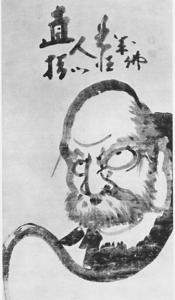Your Moment of Zen
Exploring the Meaning of a Word
James Myoun Ford
A Talk Delivered at the Inaugural of the
Anaheim Zen Sangha
A member community of the
Empty Moon Zen Network
6 April, 2019
As is my wont I was rummaging around the interwebs exploring how people use and, okay, sometimes abuse the word “Zen.” At a delightful webpage, “Pain in the English,” I ran across a query from someone using the handle “vindibul2” saying,
“I recently had the urge to use ‘zen’ to describe a way of traveling light, calm, and without want. However, after looking in a dictionary, I learned that ‘zen’ is not listed as ever being an adjective. How can this be so? I am absolutely sure I have heard things being described as ‘zen’ on television and in media.”
Of course, the writer is right. Zen has become a very elastic word, and as an adjective conveying a calm and perhaps detached approach is one of them. The Daily Show provides another. While I’ve always been too old to watch it in real time, over the years I would be treated to clips and occasionally see reruns of the full shows. This was especially true when Jon Stewart hosted the program.
I don’t recall when I first heard him say “And now for your moment of Zen.” Although I looked it up and this segment has been going since 1996. The first time it was announced I thought, oh, something about Zen! Silly me. It’s the regular concluding segment featuring a video clip that vaguely connects to some earlier episode. I find the subtext tends toward either irony or on occasion flat out non sequitur.
I think that non sequitur use is the least used. The word from Zen usage that is used for that is “koan.” But today we’re talking Zen. In the comments to that query on “Pain in the English,” “ps60s”responded, “’Zen’ used casually nowadays seems to me to mean ‘mellow,’ ‘mature without being stodgy or Establishment, ‘savvy,’ ‘cool’ and most importantly, with an insight of how all things are One, peace is a primary goal of being alive, and reverence for Nature and inner beauty is another.”
Zen practitioners, people involved in the religion and spiritual discipline called Zen are often amused, and sometimes offended by at least some of these usages. More, I think, are amused. Like my friend the Zen priest and author Gesshin Greenwood who named her blog “That’s So Zen,” Me, I too fall into the amused category. Mostly.
This made me wonder how long that word “zen” has been floating around in English. I queried some friends who care about such things. Zen priest Eshin Godfrey noted Engelbert Kaempfer’s 1727 “History of Japan” as the likely earliest citation. In his book Zen is spelled Sen.
However, several, starting with the Zen priest Jisho Warner noted the earliest generally available book to use ‘zen” was the Japanese Zen master Soen Shaku’s 1906 Sermons of a Buddhist Abbot. He is a very, very important person in Western convert Zen. Soen Roshi provided the Zen presence at the 1893 World Parliament of Religions in Chicago, and later also brought two disciples to the West, the priest Nyogen Senzaki and the scholar D. T. Suzuki.
I would hazard our contemporary loose and sometimes muddled use of Zen in fact traces to that scholar. D. T. Suzuki wrote widely in English about Zen and tended to focus on the experience of awakening as an a-historical encounter with fundamental reality. Which is a true thing. But also, Zen is something that exists within a historical context. More on that in a bit. I believe its Suzuki’s admirer a young Alan Watts, who took that idea of Zen as something beyond time and space and just ran with it. His 1926 Spirit of Zen, and more, his best-selling 1957 Way of Zenwould present Zen as only tangentially connected to an ancient spiritual tradition. It made Zen very much the thing of the moment. And led to all those uses we commonly hear today.
Zen is in fact a Japanese word, their pronunciation of the Chinese word Chan, which is the Chinese pronunciation of the Sanskrit Dhyana. Dhyana literally translates as concentration but is usually understood as meditation. So, the most normative use of the word Zen is to describe a school of Buddhism focusing on meditation.
It’s more than that. Of course. Actually, with some qualifications I like the wild usages ranging from, okay, my least favorite, non sequitur, and cool, right to harmonizing with the way things are, to the more etymologically correct type of Buddhist meditation, and the community of practice rooted in that meditation style.
In fact, Zen has always been approached from many different angles. In the early Ninth century the renowned Chinese master of both Zen and philosophical Huayen, Guifeng Zongmi spoke of five styles of Zen. In the Twentieth century the Japanese Zen master Haku’un Yasutani adapted Guifeng’s list to express his own observations about the various ways people engage Zen.
That adaptation is captured in Philip Kapleau’s monumental 1965 book Three Pillars of Zen. Yasutani took Guifeng’s lifelong attempt at reconciling the indigenous wisdoms of China, particularly Confucianism with Buddhism, and then applied it to our contemporary concern for Zen in the context of East meeting West.
Now, the list is arbitrary, both as to what it gives attention and what it ignores. It is further problematic with the implicit hierarchy in its ordering. So, hold all of it lightly, and especially please don’t take the order as suggesting the first mentioned is the least true while the last is the truest true. Rather, take this list as an invitation to consider the various things that capture our human hearts on what we might call the spiritual path. Who knows which of these is going to be that truest true for us, for you or me?
That said, the list begins with Bompu Zen. Bompu is usually rendered into English as “ordinary Zen.” But, maybe it’s better to call it “secular Zen.” This is where we encounter Zen the way many people engage yoga or Chinese movement practices – as a form of mental exercise. Often it is completely stripped of its original religious content. Zen is engaged for health, in this case mental health. Perhaps Jon Kabat-Zinn’sMindfulness Based Stress Reduction and similar programs could be seen as examples of “bompu Buddhism.”
Over the many years I’ve encountered any number of people who have come to our Zen sangha because they wanted to lower their blood pressure, get a little calmer in the storm of. Life, just finding some perspective as they live their lives. And, here’s the deal. People can practice for their health and as the practice does the practice, well, things happen. What I’ve learned watching folk who practice for health reasons, physical or mental, is they often find something of enormous value. And if that’s your goal, well, you have a place here.
Second, Shojo Zen. Rendered into English as “self-centered Zen,” is similar to Bompu. In fact all of these variations are going to overlap one way or another. I think this describes the most common ways Zen and psychology meet.
There’s a rapidly growing literature exploring Zen and Western psychology. And, me, I’ve noted psychological corrections to some aspects of Zen that have been desperately needed. I think of the work of the early American Zen teacher Joko Beck, as well as that of her successors Ezra Bayda and perhaps most importantly Barry Magid.
The focus here is on self-cultivation. Frankly, some of the wisest teachers I’ve encountered lead from this direction. If this is the Zen that calls to you, again, you’re welcome here.
Third is Gedo Zen, or “Zen outside the Way.” This is the adaptation of Zen by other spiritual traditions. I think of Christian Zen as the most vital example of this kind of Zen. The one-time Jesuit priest, scholar and Zen teacher Ruben Habito’s Living Zen, Loving God, provides a small peek into what this can look like within the Christian adaptation of Zen & its practices.
For Christian and Buddhist partisans any “Christian Zen” often feels like describing a bumble bee. It just should not be able to fly. The parts are wrong. And, yet, it does. I’ve seen people grow deep and wise in this style of Zen. So, of course, if you find this your Zen, you are most welcome here.
And, the list doesn’t end there. In fact, within what we might call “normative” or Zen there are two rather distinct variations.
Godo Zen is usually designated “Buddhist Zen.” Here we find a type of Zen focused on the saving of all beings, and the striving for awakening. The fundamental practices of Mahayana Buddhism. The reality of this way is that it actually opens the heart to the fullness of who we are. And if you’re a Buddhist looking for a Buddhist practice, welcome.
And, finally, Saijojo Zen, or “Perfected Zen.” Did I mention the difficulty of creating hierarchies simply by how we order a list? But, this is the Zen of cutting to the chase. Here is the Zen where zazen does zazen, where striving and rest are not two. Nor are they one. So, if this quiet awareness without picking or choosing is your path, welcome.
Zen. With all this a real question. What Zen will you find here?
For Zen to authentically be Zen, at least as I see it, the great matter is always about awakening. Zen in the last analysis is always about awakening – that great step away from the constraints of our sense of isolation, beyond what on the Zen way we call form and emptiness. In awakening we are neither trapped by the dualism of our mind’s engagement with the world, nor with the profound intuition of unity or boundlessness.
This is the great gift of Zen, the salving of the heart, the quickening of the spirit, the enlivening of matter. Call it the nondual life. But only if you understand these words fall short.
And, of course this nondual consciousness is not the sole property of Zen. But, Zen, I honestly believe, brings the best bag of tools going. The spiritual technologies of Zen, especially zazen, shikantaza, and koan introspection – especially as it developed in the Hakuin inheritance, are unparalleled gifts to longing human hearts. And that’s what we do here.
There are more things needed. Awakening by itself is not enough. I’ve learned that the hard way. I’ve seen people bypass their lives in the quest of that awakening beyond form and empty, who end up monsters of the spirit, people with “an eye” as we say, but who cannot balance a checkbook and sometimes incapable of governing their passions. So. Awakening is everything. And it’s not enough.
And so Zen needs something more than simply awakening and its tools. It needs larger contexts of support and integration. It needs to become not simply a private practice. Although, that intimate engagement of the individual is at the heart of it. However, it is also a communal practice. It is people rubbing up against each other, held together within a container of presence and focused with liturgy and study, work and play.
All of this taken together is a Zen of humility and spiritual friendship. Here we hold ourselves and each other accountable. And here we support each other as we explore a life worth living. And living it.
All of this.
Your moment of Zen.
Welcome.













